from Apr. 23, 1865
The Lesson of President Lincoln's Death
-
Full Title
The Lesson of President Lincoln's Death: A Speech of Wendell Phillips at the Tremont Temple, on Sunday Evening, April 23, 1865
-
Description
Abolitionist Wendell Phillips delivered this speech at Tremont Temple baptist church in Boston in the days after the Lincoln assassination. Phillips calls for African American rights as part of Lincoln's legacy.
-
Transcription
THE LESSON OF PRESIDENT LINCOLN’S DEATH: A SPEECH OF WENDELL PHILLIPS,
At the Tremont Temple, on Sunday Evening, April 23, 1865.
These are sober days. The judgments of God have found us out. Years gone by chastised us with whips; these chastise us with scorpions. Thirty years ago, how strong our mountain stood, laughing prosperity on all its sides! None heeded the fire and gloom which slumbered below. It was nothing that a giant sin gagged our pulpits; that its mobs ruled our streets, burnt men at the stake for their opinions, and hunted them like wild beasts for their humanity. It was nothing, that, in the lonely quiet of the plantation, there fell on the unpitied person of the slave every tortue which hellish ingenuity could devise. It was nothing that as husband and father, mother, and child, the negro drained to its dregs all the bitterness that could be pressed into his cup; that, torn with whip and dogs, staved, hunted, tortured, racked, he cried, “How long! O Lord, how long!” In vain did a thousand witnesses crowd our highways, telling to the world the horrors of this prison-house. None stopped to consider, none believed. Trade turned away its deaf ear; the Church gazed on them with stony brow; Letters passed by with mocking tongue. But what the world would not look at, God has set to-day in a light so ghastly bright, that it almost dazzles us blind. What the world refused to believe, God has written all over in the face of the continent, with the sword’s point, in the blood of our best and most beloved. We believe the agony of the slave’s hovel, the mother, and the husband, when it takes its seat at our board We realize the barbarism that crushed him in the sickening and brutal use of the relics of BUll RUn, in the torture and starvation of Libby Prison, where idiocy was mercy, and death was God’s best blessing; and now, still more bitterly, we must it in the coward spite which strikes an unarmed man, unwarned, behind his back; in the assassin fingers which dabble with bloody knite at the throats of old men on sick pillows. O, God! Let this lesson be enough! Spare us any more such costly teaching!
This deed is but the result, and fair representative, of the system in whose defence it was done. No matter whether it was previously approved at Richmond, or whether the assassin, if he reaches the confederates, be received with all honor, as the wretch Brooks was, and as this bloodier wretch will surely be, wherever rebels are not dumb with fear of our cannon. No matter for all this. God shows this terrible act to teach the nation, in unmistakable terms, the terrible foe with which it has to deal. But for this fiendish spirit, North and South, which holds up the rebellion, the assassin had never either wished or dared such a deed. This lurid flash only shows us how black and wide the cloud from which it sprung.
And what of him in whose precious blood this momentous lesson is writ? He sleeps in the blessings of the poor, whose fetters God commissioned him to break. Give prayers and tears to the desolate widow and the fatherless; but count him blessed far above the crowd of his fellow-men. [Fervent cries of “Amen!”] He was permitted himself to deal the last staggering blow which sent rebellion reeling to its grave; and then, holding his darling boy by the hand, to walk the streets of its surrendered capital, while his ears drank in praise and thanksgiving which bore his name to the throne of God in every form piety and gratitude could invent; and finally, to steal the sure triumph of the cause he loved with his own blood. He caught the first notes of the coming jubilee, and heard his own name in every one. Suppose that, when a boy, as he floated on the slow current of the Mississippi, idly gazing at the slave upon its banks, some angel had lifted the curtain, and shown him, that, in the prime of his manhood, he should see this proud empire rocked to its foundation in the effort to break those chains; should himself marshal the hosts of the Almighty in the grandest and holiest war that Christendom ever knew, and deal, with half-reluctant hand, that thunderbolt of justice which would smite the foul system to the dust; then die, leaving a name immortal in the study pride of our race and the undying gratitude of another, — would any credulity, however sanguine, any enthusiasm, however fervid, have enabled him to believe it? Fortunate man! He has lived todo it! [Applause.] God has graciously withheld him from any fatal misstep in the great advance, and withdrawn him at the moment which his star touched its zenith, and the nation needed a sterner hand for the work God gives it to do.
No matter now, that, unable to lead and form the nation, he was contented to be only its representative and mouthpiece; no matter, that, with prejudices hanging about him, he groped his way very slowly and sometimes reluctantly forward; let us remember how patient he was of contradiction, how little obstinate in opinion, how willing, like Lord Bacon, “to light his torch at every man’s candle.” With the least possible personal hatred; with too little sectional bitterness, often forgetting justice in mercy; tender-hearted to any misery his own eyes saw; and in any deed which needed his actual sanction, if his sympathy had limits, recollect he was human, and that he welcomed light more than most men, was more honest than his fellows, and with a truth to his own convictions such as few politicians achieve. With all his shortcomings, we point proundly to him as the natural growth of democratic institutions. [Applause.] Coming time will put him in that galaxy of Americans which makes our history the day-star of the nations, — Washington, Hamilton, Franklin, Jefferson and Jay. History will add his name to the bright list, with a more loving claim on our gratitude than either of them. No one of those was called to die for his cause. For him, when the nation needed to be raised to its last dread duty, we were prepared for it by the baptism of his blood.
What shall we say as to the punishment of rebels? The air is thick with threats of vengeance. I admire the motive which prompts these; but let us remember, no cause, however infamous, was ever crushed by punishing its advocates and abettors. All history proves this. There is no class of men base and coward enough, no matter what their view and purpose, to make the policy of vengeance successful. In bad causes, as well as good, it is still true that “the blood of the martyrs is the seed of the Church.” We cannot prevail against this principle of human nature. And, again, with regard to the dozen chief rebels, it will never be a practical question whether we shall hang them. Those not now in Europe will soon be there. Indeed, after paroling the bloodiest and guiltiest of all, Robert Lee [loud applause], there would be little fitness in hanging any lesser wretch.
The only punishment which ever crushes a cause is that which its leaders necessarily suffer in consequence of the new order of things made necessary to prevent the recurrence of their sin. It was not the blood of two peers and thirty commoners, which England shead after the rebellion of 1715, or that of five peers and twenty commoners, after the rising of 1745, which crushed the House of Stuart. Though the fight had lasted only a few months, those blocks and gibbets gave Charles his only change to recover. Bute the confiscated lands of his adherents, and the new political arrangement of the Highlands, — just, and recognized as such, because necessary, — these quenched his star forever.
Our Rebellion has lasted four years. Government has exchanged prisoners and acknowledged its belligerent rights. After that, gibbets are out of the question. A thousand men rule the Rebellion, — are the Rebellion. A thousand men! We cannot hang them all. We cannot hang men in regiments. What, over the continent with gibbets! We cannot sichen the nineteenth century with such a sight. It would sink our civilization to the level of Southern barbarism. It would forfeit our very right to supersede the Southern system, which right is based on ours being better than theirs. To make its corner-stone the gibbet would degrade us to the level of Davis and Lee. The structure of Government which bore the earthquake shock of 1861 with hardly a jar, and which now bears the assassination of its Chief Magistrate, in this crisis of civil war, with even less disturbance, needs, for its safety, no such policy of vengeance; its serene strength needs to use only so much severity as will fully guarantee security for the future.
Banish every one of these thousand rebel leaders, — every one of them, on pain of death if they every return! [Loud applause.] Confiscate every dollar and acre they own. [Applause.] These steps the world and their followers will see are necessary to kill the seeds of caste, dangerous State rights and secession. [Applause.] Banish Lee with the rest. [Applause.] No Government should ask of the South which he has wasted and the North which he has murdered such superabundant Christian patience as to tolerate in our streets the presence of a wretch whose hand upheld Libby Prison and Andersonville, and whose soul is black with sixty-four thousand deaths of prisoners by starvation and torture.
What of our new President? His whole life is a pledge that he knows and hates thoroughly that caste which is the Gibraltar of secession. Caste, mailed in States rights, seized slavery as its weapon to smite down the Union. Said Jackson, in 1833; “Slavery will be the next pretext for rebellion.” PRETEXT! That pretext and weapon we wrench from the rebel hands the moment we pass the anti-slavery amendment to the Constitution. Now kill caste, the foe who wields it. Andy Johnson is our natural leader for this. His life has been pledged to it. He put on his spurs with this vow of knighthood. He sees that confiscation, land placed in the hands of the masses, is the means to kill this foe.
Land and the ballot are the true foundations of all Governments. Intrust them wherever loyalty exists, to all those, black and white, who have upheld the flag. [Applause.] Reconstruct no State without giving to every loyal man in it the ballot. I scout all limitations of knowledge, property or race. [Applause.] Universal suffrage for me. That was the Revolutionary model. Every freeman voted, black or white, whether he could read or not. My rule is, any citizen liable to be hanged for crime is entitled to vote for rulers. The ballot insures the school.
Mr. Johnson has not yet uttered a word which shows that he sees the need of negro suffrage to guarantee the Union. The best thing he has said on this point, showing a mind open to light, is thus reported by one of the most intelligent men in the country, the Baltimore correspondent of the Boston Commonwealth: —
“The Vice-President was holding forth very eloquently in front of Admiral Lee’s dwelling, just in front of the War-Office in Washington. He said he was willing to send every negro in the countray to Africa to save the Union. Nay, he was willing to cut Africa loose from Asia, and sink the whole black rae ten thousand fathoms deep to effect this object. A loud voice sang out in the crowd, ‘Let the negro stay where he is, governor, and give him the ballot, and the Union will be safe forever!’ ‘And I am ready to do that, too!’ [loud applause] shouted the governor, with intense energy, whereat he got three times three for the noble sentiment. I witnessed this scene, and was pleased to hear that our Vice-President take this high ground, for up to this point must the nation quickly advance, or there will be no peace, no rest, no prosperity, no blessing, for our suffering and distracted country.”
The need of giving the negro a ballot is what we must press on the President’s attention. Beware the mistake which fastened McClellan on us, running too fast to indorse a man while untried, determined to manufacture a hero and leader at any rate. The President tells us that he waits to announce his policy till events call for it, — a wise, timely, and statesman-like course. Let us imitate it. Assure his in return that the government shall have our support like good citizens. But remind him that we will think him what we think of his poliey when we learn what it is. He says, “Wait: I shall punish; I shall confiscate. What more I shall do, you will know when I do it.”
Let us reply: “Good! So far, good! Banish the rebels. See to it that, beyond all mistake, you strip them of all possibility of doing harm. But see to it also that before you admit a single State to the Union, you oblige it to give every loyal man in it the ballot, — the ballot, which secures education; the ballot, which begets character where it lodges responsibility; the ballot, having which, no class need fear injustice or contempt; the ballot, which puts the helm of the Union into the hands of these who love and have upheld it. Land, — where every man’s title-deed, based on confiscation, is the bond which ties his interest to the Union; ballot, — the weapon which enables him to defend his property and the Union. These are the motives for the white man: the negro needs no motive but his instinct and heart. Give him the bullet nad ballot, he needs them; and while he holds them the Union is safe. To reconstruct now without giving the negro the ballot would be a greater blunder, and considering our better light, a greater sin that our fathers committed in 1789; and we should have no right to expect from it any less disastrous results.”
This is the lesson God teaches us in the blood of Lincoln. Like Egypt, we are made to read our lesson in the blood of our first-born, and the seats of our princes left empty. We bury all false magnanimity in this fresh grave, writing over it the maxim of the coming four years: “Treason is the greatest of crimes, and not a mere difference of opinion.” That is the motto of our leader to-day, — that the warning this atrocious crime sounds throughout the land. Let us heed it, and need no more such costly teaching. [Loud applause.]
[Transcription by: Hannah A.B., Dr. Susan Corbesero’s Class, Ellis School, Pittsburgh, Pennsylvania]
-
Source
Lincoln Financial Foundation Collection via The Internet Archive
-
Rights
This item is in the public domain and may be reproduced and used for any purpose, including research, teaching, private study, publication, broadcast or commercial use, with proper citation and attribution.
-
Tags
-
Cite this Item
Wendell Phillips. "The Lesson of President Lincoln's Death: A Speech of Wendell Phillips at the Tremont Temple, on Sunday Evening, April 23, 1865". Press of Geo. C. Rand & Avery. Remembering Lincoln. Web. Accessed June 15, 2025. https://rememberinglincoln.fords.org/node/1195
-
Creator
Wendell Phillips
-
Publisher
Press of Geo. C. Rand & Avery
-
Date
April 23, 1865
from Apr. 23, 1865
The Lesson of President Lincoln's Death: A Speech of Wendell Phillips at the Tremont Temple, on Sunday Evening, April 23, 1865

-
Description
Abolitionist Wendell Phillips delivered this speech at Tremont Temple baptist church in Boston in the days after the Lincoln assassination. Phillips calls for African American rights as part of Lincoln's legacy.
-
Source
Lincoln Financial Foundation Collection via The Internet Archive
-
Rights
This item is in the public domain and may be reproduced and used for any purpose, including research, teaching, private study, publication, broadcast or commercial use, with proper citation and attribution.
-
Creator
Wendell Phillips
-
Publisher
Press of Geo. C. Rand & Avery
-
Date
April 23, 1865
from May. 1, 1865
International Expressions of Condolence and Sympathy
-
Full Title
The Assassination of Abraham Lincoln, Late President of the United States of America…Expressions of Condolence and Sympathy Inspired by These Events
-
Description
The U.S. State Department compiled and published a collection of condolences it had received following the Abraham Lincoln's assassination.
-
Source
-
Rights
This item is in the public domain and may be reproduced and used for any purpose, including research, teaching, private study, publication, broadcast or commercial use, with proper citation and attribution.
-
Tags
-
Cite this Item
United States Department of State. "The Assassination of Abraham Lincoln, Late President of the United States of America…Expressions of Condolence and Sympathy Inspired by These Events". U.S. Government Printing Office, . Remembering Lincoln. Web. Accessed June 15, 2025. https://rememberinglincoln.fords.org/node/1191
-
Creator
United States Department of State
-
Publisher
U.S. Government Printing Office,
-
Date
1867
from May. 1, 1865
The Assassination of Abraham Lincoln, Late President of the United States of America…Expressions of Condolence and Sympathy Inspired by These Events
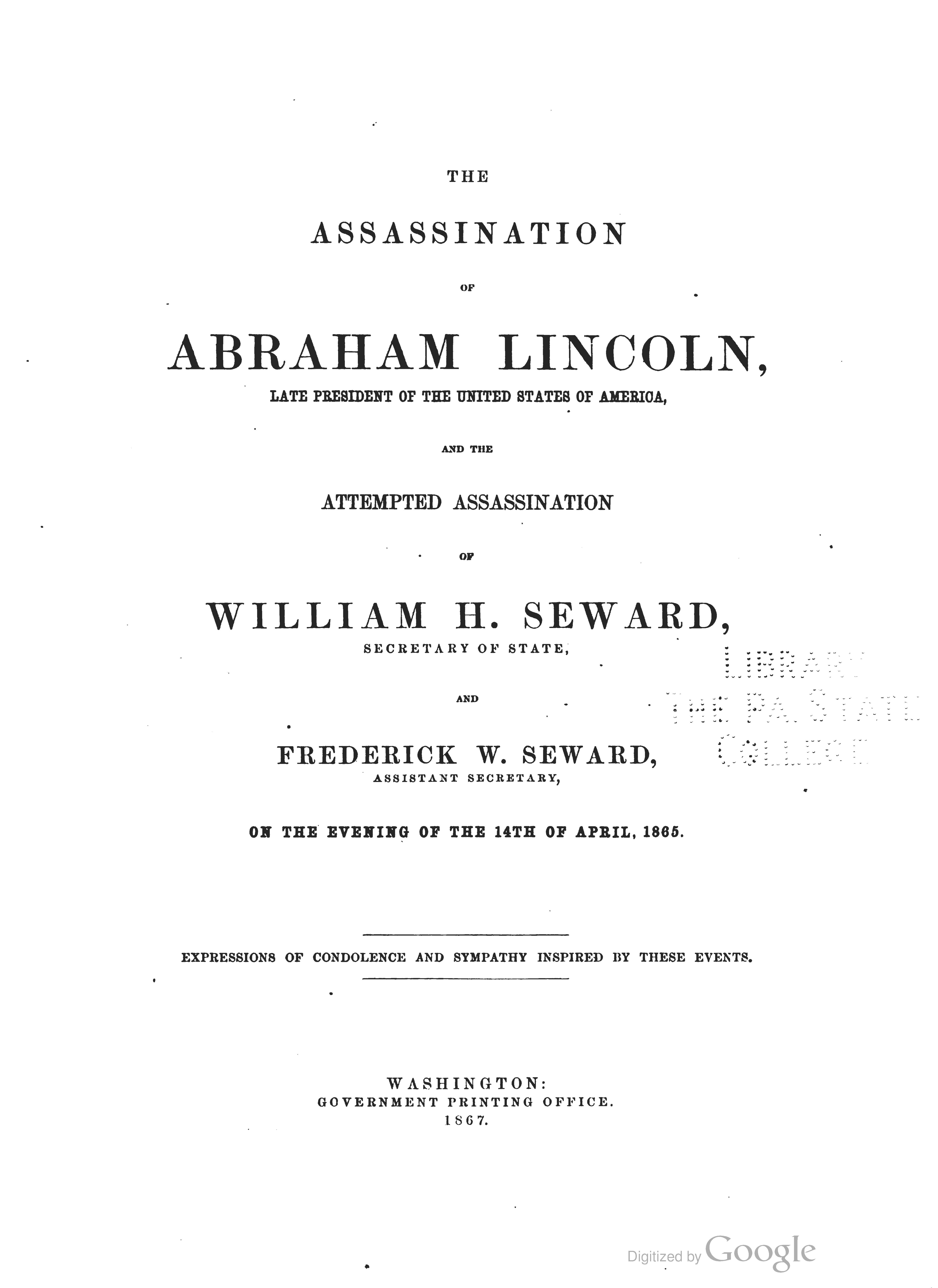
-
Description
The U.S. State Department compiled and published a collection of condolences it had received following the Abraham Lincoln's assassination.
-
Source
-
Rights
This item is in the public domain and may be reproduced and used for any purpose, including research, teaching, private study, publication, broadcast or commercial use, with proper citation and attribution.
-
Creator
United States Department of State
-
Publisher
U.S. Government Printing Office,
-
Date
May 1, 1865
from May. 1, 1865
Letters of Jane Grey Swisshelm
-
Full Title
Excerpts from Crusader and feminist; letters of Jane Grey Swisshelm, 1858-1865;
-
Description
Jane Grey Swisshelm a journalist was the editor of the Cloud Visiter [sic] and, afterward, the St. Cloud Democrat. The Minnesota Historical Society collected and compiled the series of articles and letters written for the St. Cloud Democrat, publishing them as a book in 1934. Her letters from late April and early May 1865, express her grief over Lincoln's death and her fear for the country's future.
-
Source
Library of Congress, General Collections and Rare Book and Special Collections Division
-
Rights
This item is in the public domain and may be reproduced and used for any purpose, including research, teaching, private study, publication, broadcast or commercial use, with proper citation and attribution.
-
Tags
-
Cite this Item
Jane Grey Swisshelm. "Excerpts from Crusader and feminist; letters of Jane Grey Swisshelm, 1858-1865;". The Minnesota Historical Society. Remembering Lincoln. Web. Accessed June 15, 2025. https://rememberinglincoln.fords.org/node/1186
-
Creator
Jane Grey Swisshelm
-
Publisher
The Minnesota Historical Society
-
Date
April-May 1865
from May. 1, 1865
Excerpts from Crusader and feminist; letters of Jane Grey Swisshelm, 1858-1865;
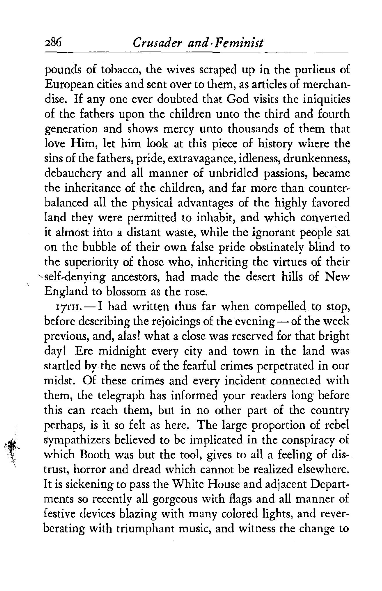
-
Description
Jane Grey Swisshelm a journalist was the editor of the Cloud Visiter [sic] and, afterward, the St. Cloud Democrat. The Minnesota Historical Society collected and compiled the series of articles and letters written for the St. Cloud Democrat, publishing them as a book in 1934. Her letters from late April and early May 1865, express her grief over Lincoln's death and her fear for the country's future.
-
Source
Library of Congress, General Collections and Rare Book and Special Collections Division
-
Rights
This item is in the public domain and may be reproduced and used for any purpose, including research, teaching, private study, publication, broadcast or commercial use, with proper citation and attribution.
-
Creator
Jane Grey Swisshelm
-
Publisher
The Minnesota Historical Society
-
Date
May 1, 1865
from May. 1, 1865
Journal of Elon Lee
-
Full Title
Journal of Elon Lee
-
Description
Elon Lee was a student at the Old University of Chicago in the 1860s. Lee wrote extensively in his journal and to his family about the Lincoln assassination and funeral, which he attended in Chicago
-
Source
Special Collections Research Center, University of Chicago Library
-
Rights
This item is in the public domain and may be reproduced and used for any purpose, including research, teaching, private study, publication, broadcast or commercial use, with proper citation and attribution.
-
Tags
-
Cite this Item
Elon Lee. "Journal of Elon Lee". Remembering Lincoln. Web. Accessed June 15, 2025. https://rememberinglincoln.fords.org/node/1185
-
Creator
Elon Lee
-
Date
April-May 1865
from May. 1, 1865
Journal of Elon Lee
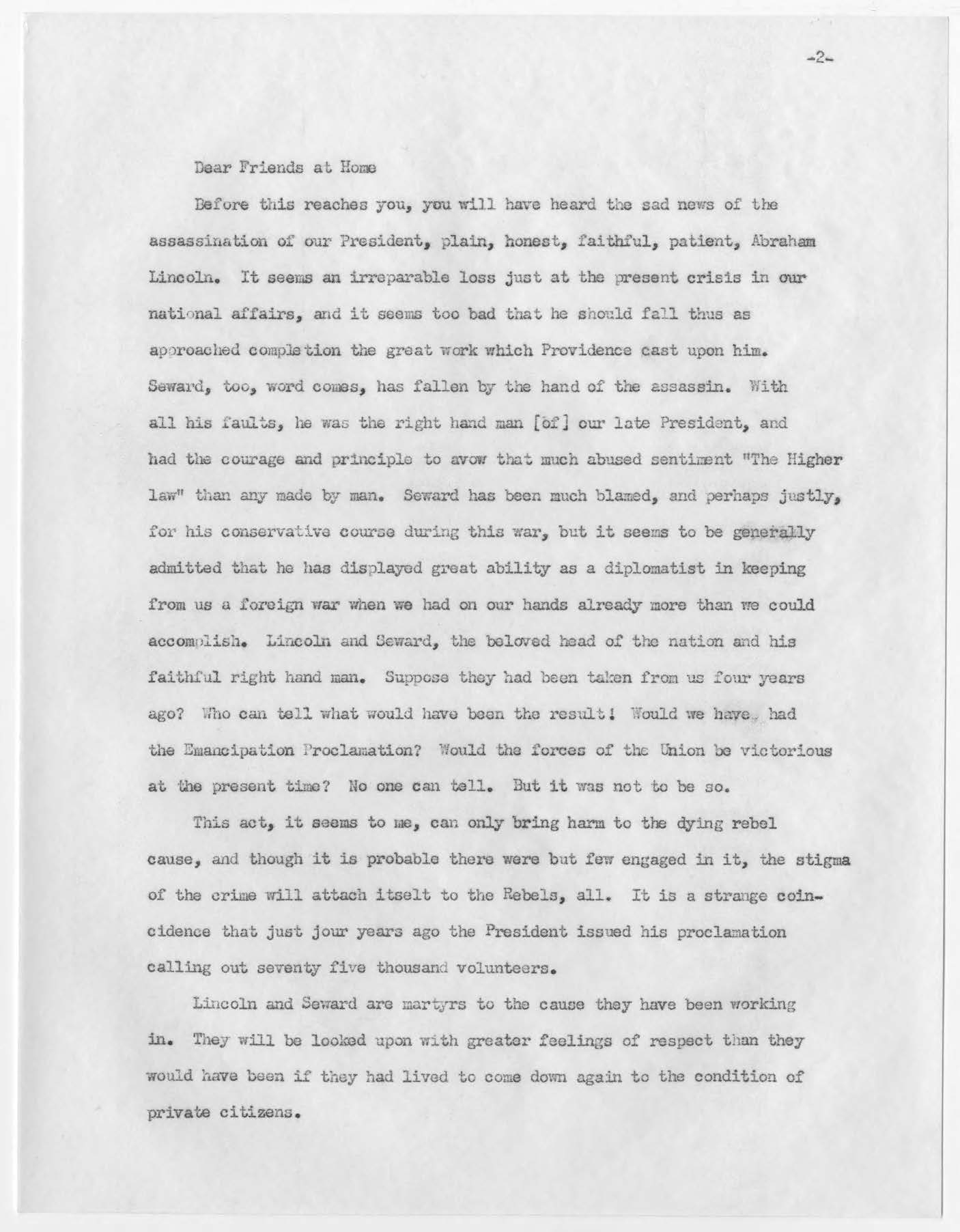
-
Description
Elon Lee was a student at the Old University of Chicago in the 1860s. Lee wrote extensively in his journal and to his family about the Lincoln assassination and funeral, which he attended in Chicago
-
Source
Special Collections Research Center, University of Chicago Library
-
Rights
This item is in the public domain and may be reproduced and used for any purpose, including research, teaching, private study, publication, broadcast or commercial use, with proper citation and attribution.
-
Creator
Elon Lee
-
Date
May 1, 1865
from Jun. 6, 1865
A letter from Robert Todd Lincoln to Dr. Josiah G. Holland
-
Full Title
A letter from Robert Todd Lincoln to Dr. Josiah G. Holland
-
Description
A letter from Robert Todd Lincoln to Dr. Josiah G. Holland, a writer who later wrote a biography of Abraham Lincoln called the Life of Abraham Lincoln in 1866.
-
Transcription
Chicago June 6th/65
My dear Sir
Your letter received
some days ago & I have unfortunately
mislaid it, so that I have to answer
it from memory.
As I understand your purpose
it is to write a biography which is
to be rather personal than political.
With regard to sources of information
I may be able to guide you a little
One of my father’s old time friends
is Dr. A. G. Henry of Washington
City, D.C. & who may be addressed in
care of Senator Williams at Washington, D.C. He was
very intimate with him after some time
in 1830-35 & will be please to help you
all he can. Another of his friends of
among those to whom you might
apply. I understand that Mr. H
is intending to write a biography
himself & you will judge for yourself
as to whether to write to him.
I have explained at some length
the reasons of the messiness of my
knowledge & I try you will attribute
the little value of this letter to that cause.
With great respect I am
Very sincerely yours
Robert T. Lincoln
Dr. J.E. Holland
&c &c
[*Robert T. Lincoln*]
[Transcription by Henry R.] -
Source
Special Collections Research Center, University of Chicago Library
-
Rights
This item is in the public domain and may be reproduced and used for any purpose, including research, teaching, private study, publication, broadcast or commercial use, with proper citation and attribution.
-
Tags
-
Cite this Item
Robert Todd Lincoln . "A letter from Robert Todd Lincoln to Dr. Josiah G. Holland". Remembering Lincoln. Web. Accessed June 15, 2025. https://rememberinglincoln.fords.org/node/1180
-
Creator
Robert Todd Lincoln
-
Date
June 6, 1865
from Jun. 6, 1865
A letter from Robert Todd Lincoln to Dr. Josiah G. Holland
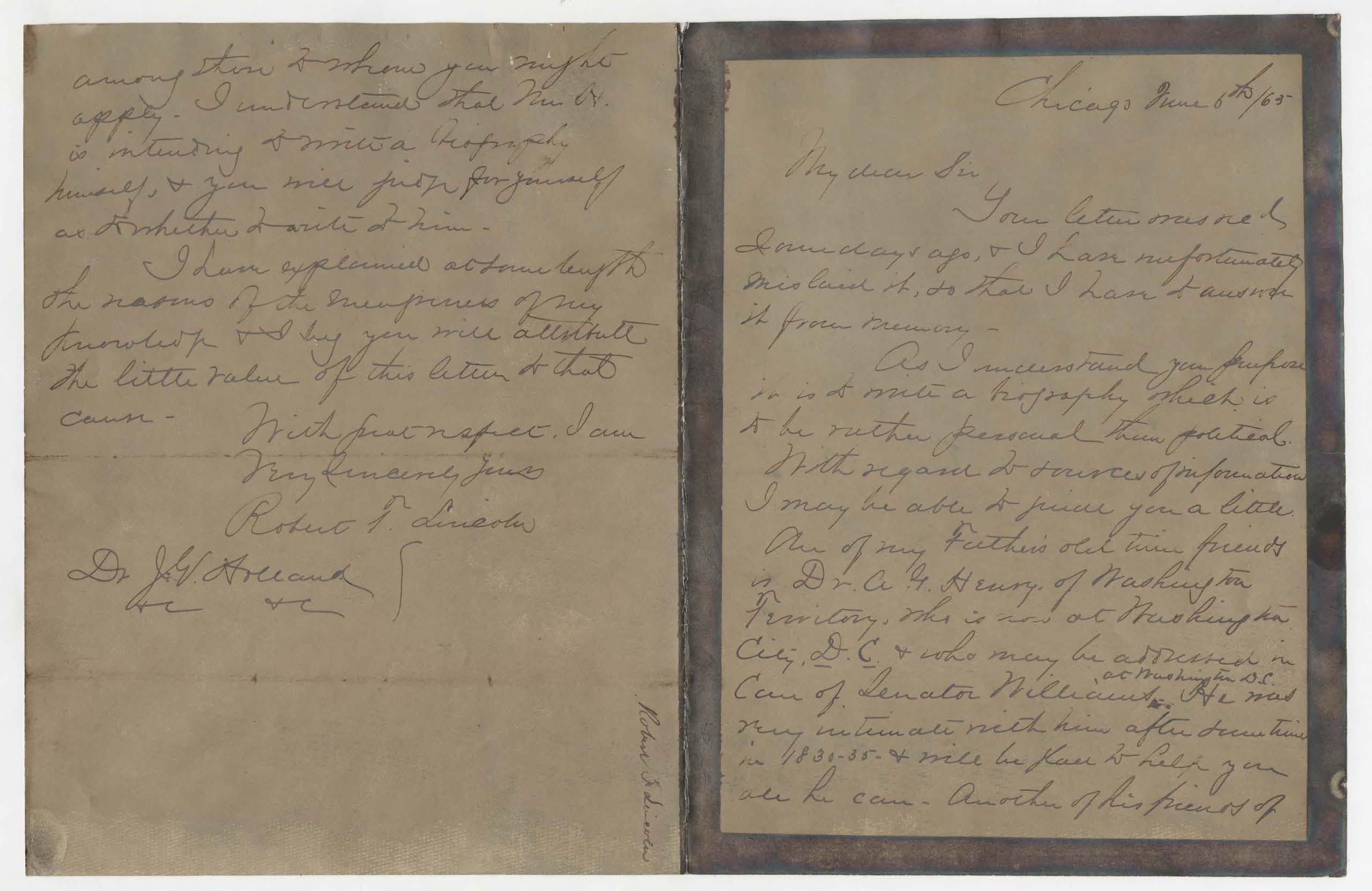
-
Description
A letter from Robert Todd Lincoln to Dr. Josiah G. Holland, a writer who later wrote a biography of Abraham Lincoln called the Life of Abraham Lincoln in 1866.
-
Source
Special Collections Research Center, University of Chicago Library
-
Rights
This item is in the public domain and may be reproduced and used for any purpose, including research, teaching, private study, publication, broadcast or commercial use, with proper citation and attribution.
-
Creator
Robert Todd Lincoln
-
Date
June 6, 1865
from Dec. 4, 1865
Mary Todd Lincoln to Dr. Josiah G. Holland
-
Full Title
Mary Todd Lincoln to Dr. Josiah G. Holland
-
Description
A letter from Mary Todd Lincoln to Dr. Josiah G. Holland after receiving a copy of Holland's biography of her husband, the Life of Abraham Lincoln.
-
Transcription
Chicago Dec 4th 1865
Private –
Dr. J. G. Holland
My dear Sir:
The Biography of my deeply lamented husband, which you have so kindly sent me, has been received and read, with very great interest. After a careful perusal of the work, I find the statements, in most instances, so very correct, that I feel quite surprised, as to the extent of your minute information. From the description of my husband, early struggles, which he has, so frequently described to me, to the foolish and uncalled for rencontre, with Gen Shields, all are truthfully portrayed.
It is exceedingly painful to me, now suffering under such an overwhelming bereavement, to recall that happy time my beloved husband had so entirely devoted himself to one, for two years before my marriage, that I doubted trespassed, many times & oft, upon his great tenderness & amiability of character. There never existed a more loving & devoted husband & such a Father, has seldom been bestowed on children. Crushed and bowed to the earth, with our great great sorrow, for the sake of my poor afflicted boys, I have to strive to live on, and comfort them, as well as I can. You are aware that with all the President’s deep feeling, he was not a demonstrative man, when he felt most deeply, he expressed the least. There are some very good persons who are inclined to magnify conversations & incidents, connected with their slight acquaintance with this great & good man. For instance, the purported conversations This last event, occurred about six months before our marriage, when, Mr. Lincoln thought he had some right to assume to be my champion, even on frivolous occasions. The poor Gent, in our little gay circle, was oftentimes, the subject of mirth & even song. And we were then surrounded by several of those, who have since been appreciated by the world. The Gent was very impulsive & on the occasion referred to, had placed himself before us, in so ridiculous a light, that the love of the ludicrous had been excited within me & I pressure, I gave vent to it, in some very silly levies. After the reconciliation between the contending parties Mr L & myself mutually agreed never to refer to it & except in an occasional light manner, between us, it was never mentioned. I am surprised at so distant a day, you should have ever heard of the circumstance.
Between the President & the Hospital nurse, it was not his nature to commit his griefs and religious feelings so fully to words & that with an entire stranger. Even between ourselves, when our deep & touching sorrows were one & the same, his expressions were few – Also the lengthy account of the lady who very wisely persisted in claiming a hospital for her State, my husband never had the time to discuss these matters, so lengthily to any person or persons-- too many of them came daily in review before him – And again, I cannot understand how strangely his temper could be at so complete a variance from what it always was, in the home circle. There he was always so gentle & kind. Before closing this long letter which I fear will weary you, ___ you get through it – allow me again to assure you of the great satisfaction the perusal of your Memoirs have given me.
I remain very truly and gratefully,
Mary Lincoln
[Transcription by Susan Brady Carr] -
Source
Special Collections Research Center, University of Chicago Library
-
Rights
This item is in the public domain and may be reproduced and used for any purpose, including research, teaching, private study, publication, broadcast or commercial use, with proper citation and attribution.
-
Tags
-
Cite this Item
Mary Todd Lincoln. "Mary Todd Lincoln to Dr. Josiah G. Holland". Remembering Lincoln. Web. Accessed June 15, 2025. https://rememberinglincoln.fords.org/node/1179
-
Creator
Mary Todd Lincoln
-
Date
December 4, 1865
from Dec. 4, 1865
Mary Todd Lincoln to Dr. Josiah G. Holland
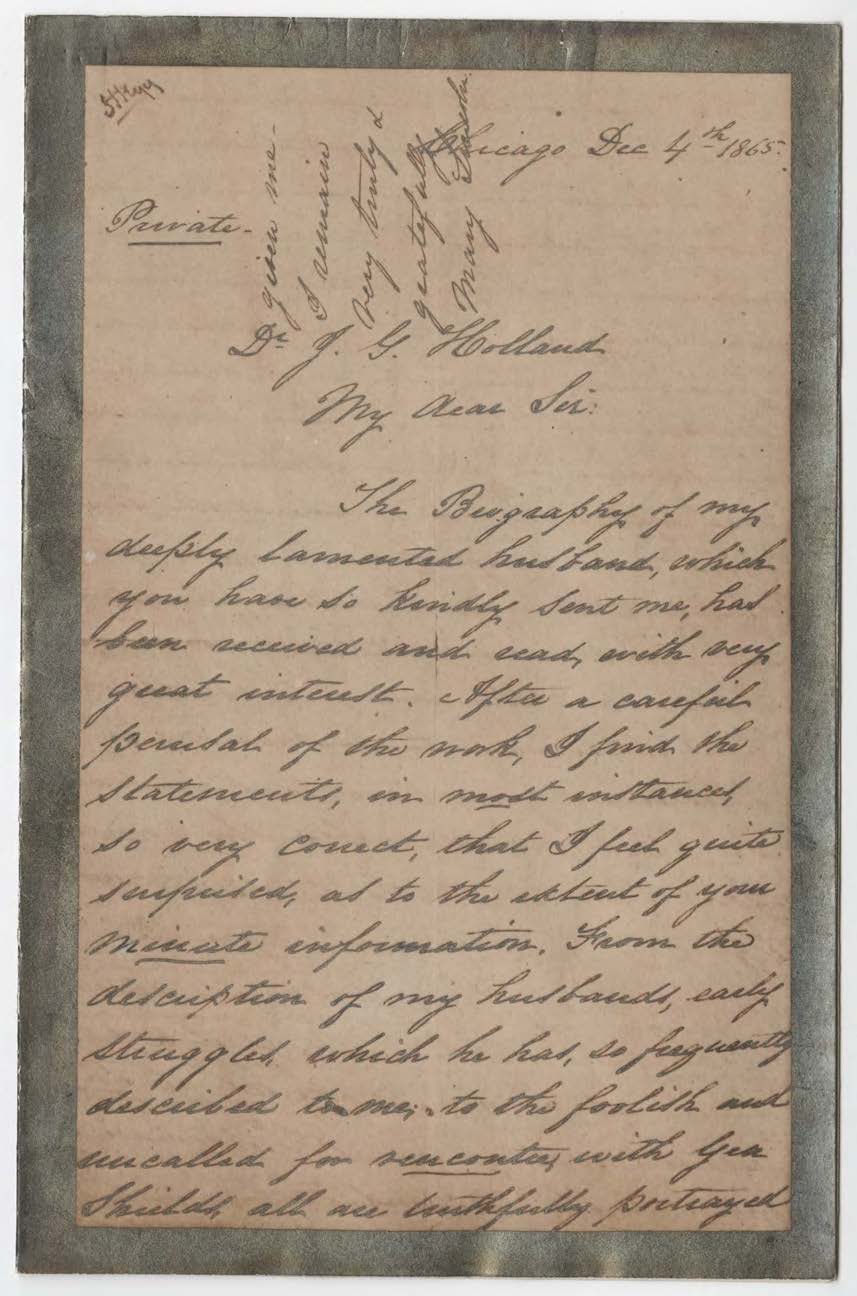
-
Description
A letter from Mary Todd Lincoln to Dr. Josiah G. Holland after receiving a copy of Holland's biography of her husband, the Life of Abraham Lincoln.
-
Source
Special Collections Research Center, University of Chicago Library
-
Rights
This item is in the public domain and may be reproduced and used for any purpose, including research, teaching, private study, publication, broadcast or commercial use, with proper citation and attribution.
-
Creator
Mary Todd Lincoln
-
Date
December 4, 1865
from Aug. 31, 1865
A Letter from Mary Todd Lincoln to Mrs. Anson G. Henry
-
Full Title
A Letter from Mary Todd Lincoln to Mrs. Anson G. Henry
-
Description
A Letter from Mary Todd Lincoln to Mrs. Anson G. Henry. Mrs. Henry's husband was a friend of Abraham Lincoln and the Surveyor General of Washington Territory at the time of Lincoln's death. Dr. Henry died on July 30, 1865. Mary Lincoln's letter expresses her sympathy for Mrs. Henry and her own grief for the death Dr. Henry and her husband.
-
Transcription
Chicago, Aug 31st 1865.
My very dear Mrs. Henry,
Bowed down and broken hearted, and feeling so deeply for you, in your agonizing bereavement, I feel justified in approaching you at this time when we all feel I’ll alike crushed.
We’ve have both been called upon to resign, to our Heavenly Father, two of the best men & the most devoted husbands that too unhappy women ever possessed.
The terrible news that our beloved friend who so sympathized with us in our irreparable loss, is gone, has been received by us, only a day or two since. My sons and myself have been overcome, by the startling and heart rendering intelligence. We consider that we have lost our best & dearest friend. It has been my most ardent wish that Dr. Henry should have received an appointment in Washington, it would have been a great comfort to us, in our own overwhelming sorrow to have had you both near us. In this great trial, it is difficult, to be taught resignation, the only comfort, that remains to us is the blessed consolation, that our beloved ones, are rejoicing in their Heavenly Home, free from all earthly trials & in the holy presence of God & his angels, are singing the praises of the Redeemer. I long, to lay my own weary head, down to rest, by the side of my darling husband. I pray God, to grant me sufficient grace, to await his time, for I long, to be at rest. Without my idolized husband, I do not wish to remain on earth.
Mr. Wm. T. Henry, called a day or two since. I was confined to my bed & did not see him. Robert saw him & he left, your telegram. Robert, immediately, wrote on to Washington, urging & pleading, for the appointment, of your son in law. We pray & trust the appeal, will be granted. You have no one, my dear friend, who could possibly feel for you, as I do, your grief is mine, in it, I am living over my own disconsolate state & the gratitude we feel for the dear Doctor’s recent sympathy, for us, in all things together with the great love, we all bore him, makes your troubles my own. How much, I wish, you lived nearer to us. We could then, weep, together over our dreary lot. The world, without my beloved husband & our best friend, is a sad and lonely place enough.
Our poor little family, would be a gloomy picture, for any one to see, who has a heart to feel. It was a great trial, to me, when Dr. Henry left here in June, that I was unable to have access to some boxes, stored in the warehouse, where was deposited a cane of my husband’s, a large family Bible & some other things design for presentation, to the Dr. So soon as I can get to them, I shall avail myself, of the first opportunity, of sending them to you. I can offer you in conclusion, of this very sad letter, my dear Mrs. Henry, very little consolation, for I am so weary & heavy laden myself, over everything, concerning us both. I trust you will write me to me, for you are very dear to me, now & ever.
With regards to your family, I remain always
Your attached friend,
Mary Lincoln.
[Transcription by Alicia B., Ford's Theatre Society, and Janet Scanlon.] -
Source
Special Collections Research Center, University of Chicago Library
-
Rights
This item is in the public domain and may be reproduced and used for any purpose, including research, teaching, private study, publication, broadcast or commercial use, with proper citation and attribution.
-
Tags
-
Cite this Item
Mary Todd Lincoln. "A Letter from Mary Todd Lincoln to Mrs. Anson G. Henry". Remembering Lincoln. Web. Accessed June 15, 2025. https://rememberinglincoln.fords.org/node/1178
-
Creator
Mary Todd Lincoln
-
Date
August 31, 1865
from Aug. 31, 1865
A Letter from Mary Todd Lincoln to Mrs. Anson G. Henry
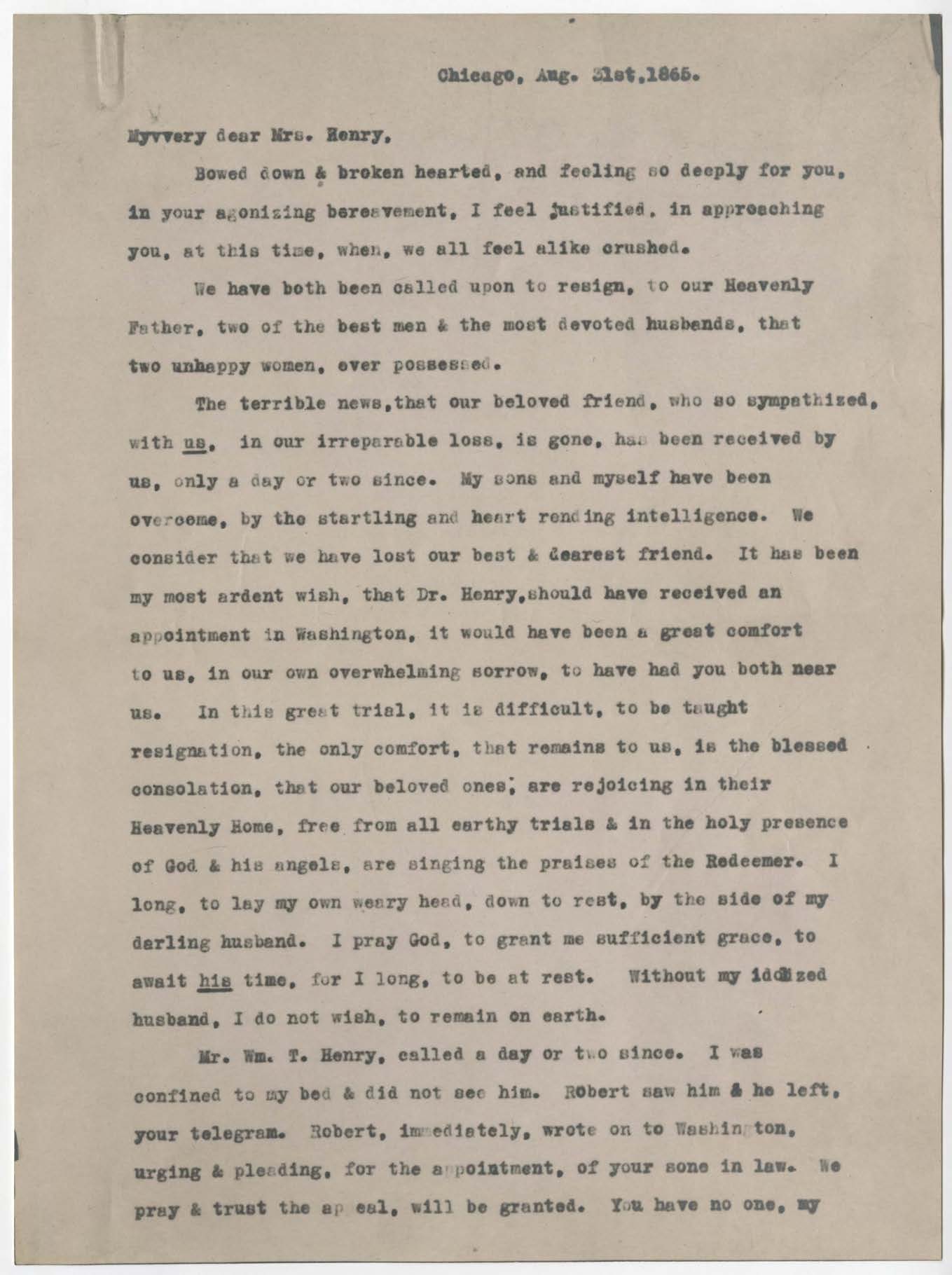
-
Description
A Letter from Mary Todd Lincoln to Mrs. Anson G. Henry. Mrs. Henry's husband was a friend of Abraham Lincoln and the Surveyor General of Washington Territory at the time of Lincoln's death. Dr. Henry died on July 30, 1865. Mary Lincoln's letter expresses her sympathy for Mrs. Henry and her own grief for the death Dr. Henry and her husband.
-
Source
Special Collections Research Center, University of Chicago Library
-
Rights
This item is in the public domain and may be reproduced and used for any purpose, including research, teaching, private study, publication, broadcast or commercial use, with proper citation and attribution.
-
Creator
Mary Todd Lincoln
-
Date
August 31, 1865
from Apr. 19, 1865
A Letter from Dr. Anson G. Henry to his wife
-
Full Title
A Letter from Dr. Anson G. Henry to his wife
-
Description
Dr. Anson G. Henry was a friend of Abraham Lincoln from Springfield who he had appointed as Surveyor General of Washington Territory during his presidency. He was in Washington following the assassination and wrote his wife about his grief and that of Mary Lincoln
-
Source
Special Collections Research Center, University of Chicago Library
-
Rights
This item is in the public domain and may be reproduced and used for any purpose, including research, teaching, private study, publication, broadcast or commercial use, with proper citation and attribution.
-
Tags
-
Cite this Item
Anson G. Henry . "A Letter from Dr. Anson G. Henry to his wife". Remembering Lincoln. Web. Accessed June 15, 2025. https://rememberinglincoln.fords.org/node/1175
-
Creator
Anson G. Henry
-
Date
April 19, 1865
from Apr. 19, 1865
A Letter from Dr. Anson G. Henry to his wife
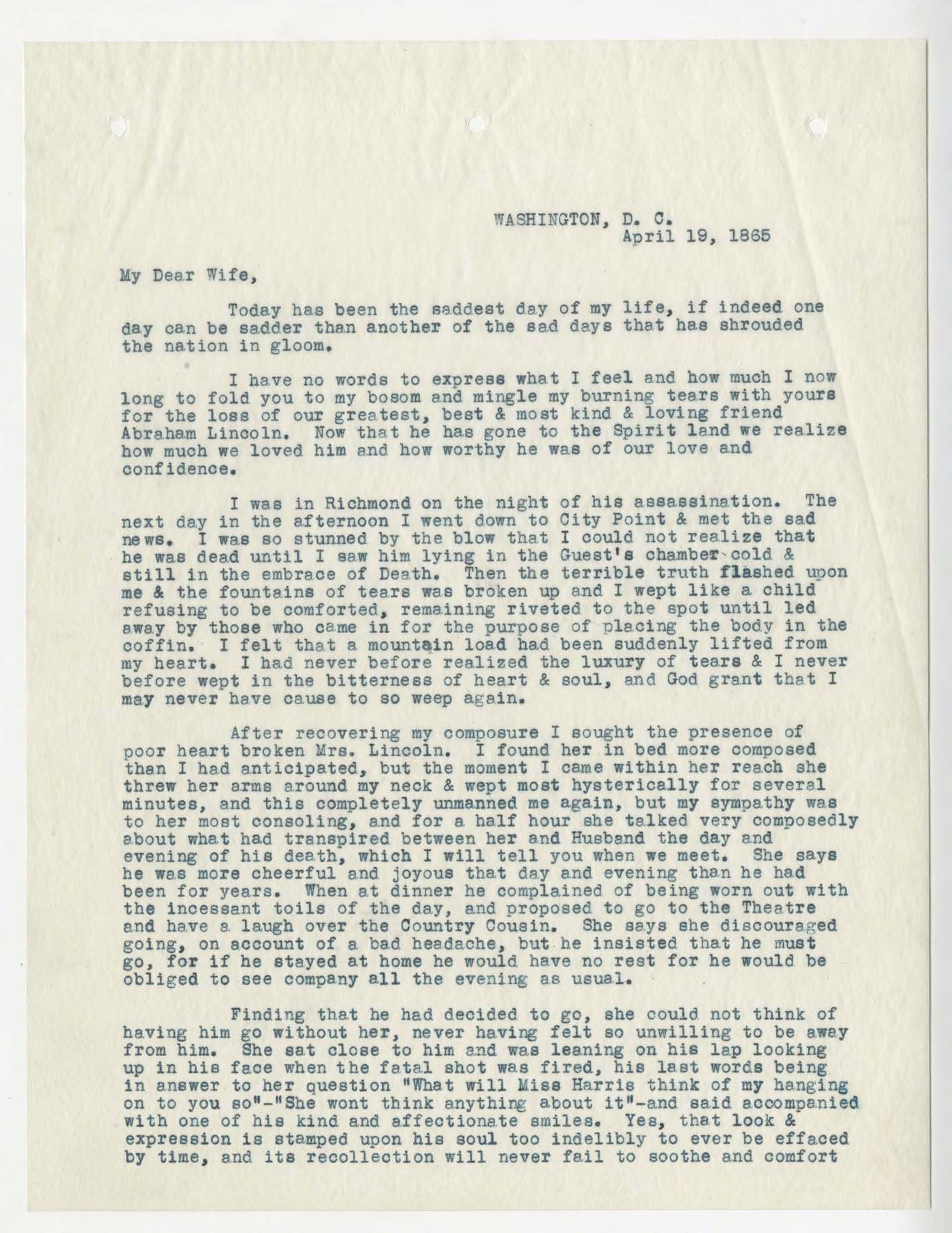
-
Description
Dr. Anson G. Henry was a friend of Abraham Lincoln from Springfield who he had appointed as Surveyor General of Washington Territory during his presidency. He was in Washington following the assassination and wrote his wife about his grief and that of Mary Lincoln
-
Source
Special Collections Research Center, University of Chicago Library
-
Rights
This item is in the public domain and may be reproduced and used for any purpose, including research, teaching, private study, publication, broadcast or commercial use, with proper citation and attribution.
-
Creator
Anson G. Henry
-
Date
April 19, 1865
from May. 1, 1865
When Lilacs Last in the Door-Yard Blooms
-
Full Title
When Lilacs Last in the Door-Yard Bloom'd in the Sequel to Drum-Taps
-
Description
In 1865, Walt Whitman published Drum-Taps, a collections of poems written during the war. A sequel was published the following year, which included Oh Captain! My Captain! and When Lilacs Last in the Door-Yard Bloom'd, both written in response to the Lincoln Assassination. When Lilacs Last in the Door-Yard Bloom'd was written in the form of an elegy during the summer of 1866.
-
Source
-
Rights
This item is in the public domain and may be reproduced and used for any purpose, including research, teaching, private study, publication, broadcast or commercial use, with proper citation and attribution.
-
Tags
-
Cite this Item
Walt Whitman. "When Lilacs Last in the Door-Yard Bloom'd in the Sequel to Drum-Taps". Remembering Lincoln. Web. Accessed June 15, 2025. https://rememberinglincoln.fords.org/node/1172
-
Creator
Walt Whitman
-
Date
Summer 1865
from May. 1, 1865
When Lilacs Last in the Door-Yard Bloom'd in the Sequel to Drum-Taps
-
Description
In 1865, Walt Whitman published Drum-Taps, a collections of poems written during the war. A sequel was published the following year, which included Oh Captain! My Captain! and When Lilacs Last in the Door-Yard Bloom'd, both written in response to the Lincoln Assassination. When Lilacs Last in the Door-Yard Bloom'd was written in the form of an elegy during the summer of 1866.
-
Source
-
Rights
This item is in the public domain and may be reproduced and used for any purpose, including research, teaching, private study, publication, broadcast or commercial use, with proper citation and attribution.
-
Creator
Walt Whitman
-
Date
May 1, 1865
from May. 1, 2018
A Tribute of Respect by the Citizens of Troy
-
Full Title
A Tribute of Respect by the Citizens of Troy, to the Memory of Abraham Lincoln
-
Description
Compiled documents relating to Lincoln's assassination in Troy, New York and the citizen's mourning. It includes sermons, addresses, and minutes from meetings.
-
Source
-
Rights
This item is in the public domain and may be reproduced and used for any purpose, including research, teaching, private study, publication, broadcast or commercial use, with proper citation and attribution.
-
Tags
-
Cite this Item
Various. "A Tribute of Respect by the Citizens of Troy, to the Memory of Abraham Lincoln". J. Munsell . Remembering Lincoln. Web. Accessed June 15, 2025. https://rememberinglincoln.fords.org/node/1168
-
Creator
Various
-
Publisher
J. Munsell
-
Date
1865
from May. 1, 2018
A Tribute of Respect by the Citizens of Troy, to the Memory of Abraham Lincoln
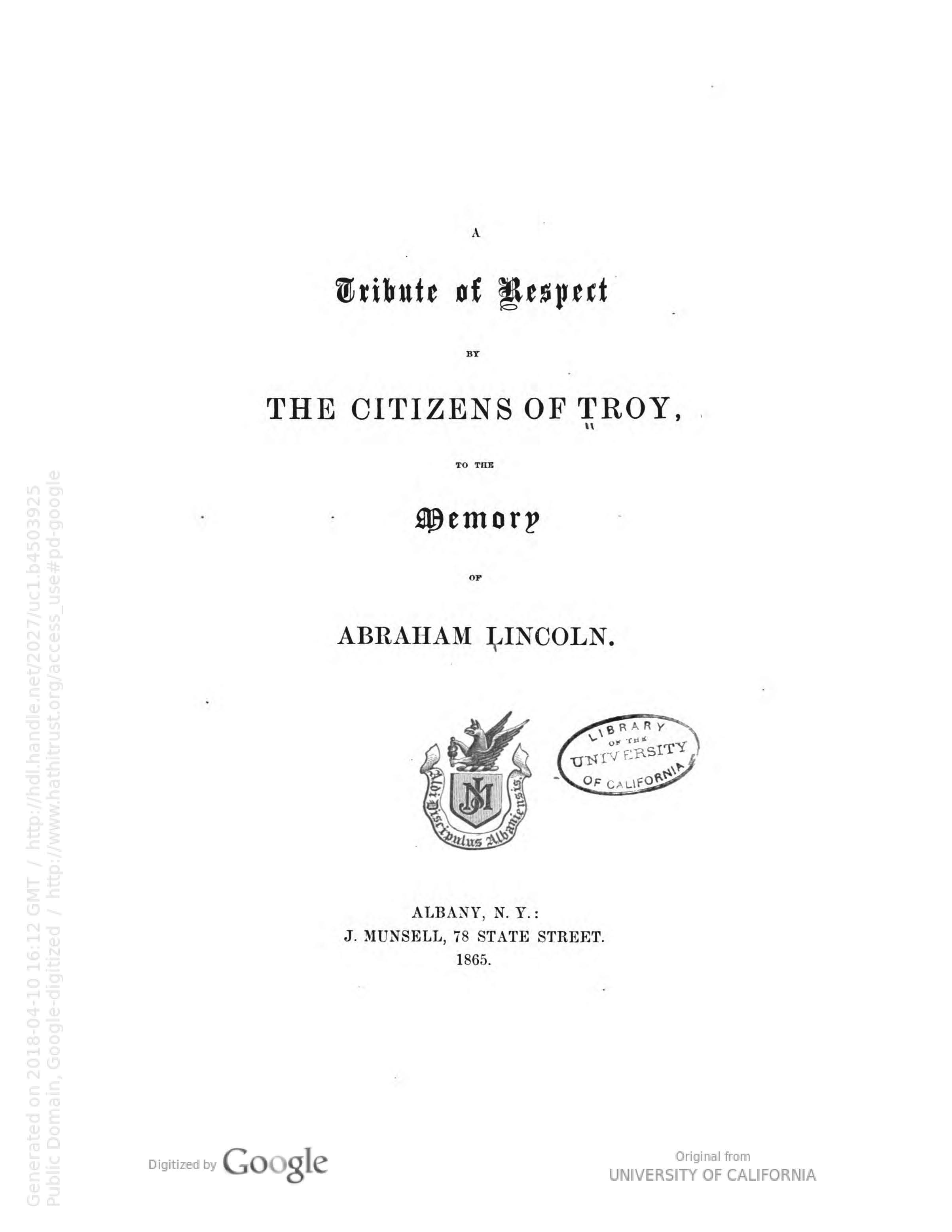
-
Description
Compiled documents relating to Lincoln's assassination in Troy, New York and the citizen's mourning. It includes sermons, addresses, and minutes from meetings.
-
Source
-
Rights
This item is in the public domain and may be reproduced and used for any purpose, including research, teaching, private study, publication, broadcast or commercial use, with proper citation and attribution.
-
Creator
Various
-
Publisher
J. Munsell
-
Date
May 1, 2018